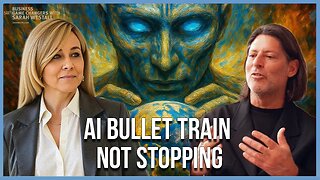Premium Only Content

Episode 3224: The Burden of Spiritual Sight: Seeing What Others Do Not
www.catholic-reboot.com
Nightly Zoom Coordinates for Rosary:
Meeting ID: 865 8978 0399
Passcode: Wjjv4960!
Speak Lord for your Servant is Listening
Book Recommendation of the Day
St. Gregory of Nyssa (c. 335–c. 395)
Book: The Life of Moses.
Gregory explains the stages of ascent: first darkness (faith), then light (illumination), and finally the “dazzling darkness,” where the soul perceives God beyond sight a mystical seeing beyond vision.
What happens when God grants sight others do not have? Its is called “Spiritual Sight”. Sometimes referred to as the eyes of the soul, illumination, or the vision of God granted to holy men and women. It is both a gift and a burden an invitation to carry the cross of misunderstanding, ridicule, and even isolation. We explore the danger of spiritual sight, not as hidden wisdom for pride, but as the grace to love more, suffer more, and remain faithful to Christ the Light.
There is a peculiar weight carried by those whom God permits to see more deeply than others. To see truth clearly in an age of confusion is both a gift and a trial. Our Lord warned us plainly: “To whom much is given, much will be required” (Luke 12:48). Spiritual sight is never granted for curiosity or pride; it is entrusted for fidelity, sacrifice, and witness.
Yet the danger is real. Those who see what others do not are often misunderstood, mocked, or rejected. The prophet Jeremiah cried out: “I am in derision daily; everyone mocketh me” (Jer. 20:7).
St. Augustine confessed that the light of truth dazzled and unsettled him, alienating him from old friendships. The saints knew well that insight into divine mysteries is inseparable from the cross.
In our world, which chases after hidden knowledge and prides itself on “special insights,” the Catholic must be reminded that all true light comes only from Christ. To see with His eyes is not an achievement, but a responsibility. It means interceding for the blind, bearing patiently with those who mock, and guarding the heart against pride.
We reflect on this burden of spiritual sight: its grace, its dangers, and its call. We will turn to the wisdom of the Fathers, the witness of the saints, and the teaching of Holy Scripture to understand how the gift of sight is meant not for self-exaltation, but for deeper love, humility, and fidelity.
The Burden of Spiritual Sight: Seeing What Others Do Not
Today, we reflect on the theme: “The Danger of Seeing What Others Don’t.”
In a world that often prizes “hidden knowledge” and mystical insights apart from Christ, the true Catholic must remember that spiritual sight is a grace and with it comes both burden and responsibility. As Our Lord declared: “To whom much is given, much will be required” (Luke 12:48).
The early Fathers remind us that those given insight into divine mysteries are not called to pride or self-exaltation, but to suffering, intercession, and fidelity in the face of misunderstanding. Let us explore this reality with their wisdom.
Segment 1: The Grace and Danger of Spiritual Sight
• Patristic Insight: St. Augustine, in his Confessions, describes how the light of truth dazzled him, but how this same light exposed his sins and alienated him from worldly friendships. He saw what others could not, and it brought him interior struggle before peace.
• Catholic Perspective: The danger of seeing spiritual truths that others ignore is not that the truth is harmful, but that it isolates the believer. The prophet Jeremiah lamented: “I am in derision daily, everyone mocketh me” (Jer. 20:7).
• Reflection: When the scales of sin fall from our eyes, as they did for St. Paul, we cannot return to blindness. But seeing clearly often means carrying a cross ridicule, rejection, even persecution.
Segment 2: The Weight of Prophetic Witness
• Example: The Desert Fathers often warned that insight without humility is dangerous.
• Abba Anthony once said: “There will come a time when men will go mad, and when they see someone who is not mad, they will attack him, saying, ‘You are mad, you are not like us.’”
• Catholic Perspective: This is precisely the danger of seeing differently. To recognize the emptiness of modern relativism, to discern the corruption within the Church, or to resist popular sin these insights set one apart.
• Patristic Witness: St. John Chrysostom, in his homilies, warned that prophets are rarely loved in their own times because they disturb the comfortable illusions of society.
Segment 3: The Temptation of Pride and Isolation
• Patristic Insight: St. Gregory the Great, in his Pastoral Rule, cautions pastors not to take pride in being able to discern what others cannot. Vision without charity breeds arrogance.
• Catholic Perspective: To see what others do not must never become a source of superiority, but of deeper charity. The saints suffered not only from misunderstanding but also from the temptation to withdraw from the ignorant in contempt.
• Reflection: The danger is twofold rejection by others, and pride within oneself. Only humility keeps the soul safe.
Segment 4: Christ the True Light
• Scriptural Anchor: “The light shineth in darkness, and the darkness comprehended it not” (John 1:5).
• Patristic Witness: St. Irenaeus teaches that Christ is the fullness of revelation all true “sight” is participation in His Light. Outside of Him, so-called insight devolves into illusion or occultism.
• Catholic Application: The world speaks of “seeing what others cannot” as if it is a secret wisdom, but the Church proclaims that all light comes from Christ, given not to puff up but to save.
Segment 5: The Call to Share the Vision
• Patristic Insight: St. Augustine urged: “If you see charity, you see the Trinity.” True sight manifests in works of love, not in esoteric speculation.
• Catholic Perspective: The saints remind us that when God grants a soul deeper sight whether into His mysteries, into the state of souls, or into the deception of the age it is for mission, not self-satisfaction.
• Reflection: The danger is real but so is the calling. To see is to be sent.
Conclusion
So what is the true danger of seeing what others don’t? It is the temptation to pride, the pain of isolation, and the cross of rejection. Yet, through the Fathers we learn that sight is a gift of Christ’s Light, given so that we might intercede, witness, and love more perfectly.
Epistle: 2 Esdras 8:1–10
"And Ezra the scribe stood upon a step of wood... and he read plainly before the street, that was before the water gate, from morning until midday... And the people wept, when they heard the words of the law."
Reflection on the Epistle
The people of Israel had strayed from the Law of God during their exile. When Ezra read it aloud, they were pierced to the heart and wept for their sins. But he reminded them: “Do not be sad: for the joy of the Lord is our strength.”
This passage resonates today as the Church faces a spiritual exile of her own. Many Catholics no longer know the Law of God, the Catechism, or the demands of Tradition. Like Israel, we need to hear the Law again with clarity and reverence, so that it cuts through our complacency. The penitential character of Ember Wednesday fits perfectly here: the faithful are reminded that fasting, prayer, and penance restore us to the covenant and prepare us for grace.
Our Lady of Ransom also speaks into this moment. She is invoked as the one who rescues her children from slavery not only to earthly captors but from the ignorance and sin that bind our souls. Just as Ezra recalled Israel to God’s Law, Our Lady recalls us to her Son’s redeeming truth.
Gospel – Mark 9:16–28
"And one of the multitude answering, said: Master, I have brought my son to thee, who hath a dumb spirit... And he cried out, and tearing him grievously, he foamed, and pined away... And Jesus said to him: If thou canst believe, all things are possible to him that believeth. And immediately the father of the boy crying out, with tears said: I do believe, Lord: help my unbelief... And He said to them: This kind can go out by nothing, but by prayer and fasting."
Reflection on the Gospel
The afflicted boy in today’s Gospel is an image of souls enslaved by sin and the devil mute to prayer, deaf to God’s Word, tormented and cast down. His father’s plea “Lord, I believe; help my unbelief” is the cry of every parent, priest, and faithful Catholic who longs for healing in our time.
Christ’s answer is clear: the Church cannot overcome the demons of our age whether impurity, apostasy, or worldliness without prayer and fasting. This is why Holy Mother Church calls us to keep the Ember Days: they are a weapon of intercession, sanctification, and penance.
Our Lady of Ransom embodies this Gospel truth. Her feast originated with the Mercedarian Order, founded to ransom Christians enslaved by enemies of the faith. But her deeper work is to intercede for us, that we may be freed from the captivity of sin and strengthened to live as faithful disciples of her Son.
Feast of Our Lady of Ransom
The feast of Our Lady of Ransom (Our Lady of Mercy) was established in thanksgiving for Mary’s aid in freeing Christians held captive during centuries of Muslim raids in Europe. She is invoked as a mother who comes to the aid of her children in bondage. Today, though fewer are chained physically, countless souls are enslaved spiritually by sin, error, and despair. To her we must turn with confidence, asking to be delivered into the freedom of Christ.
Application for Today
• Recover reverence for God’s Law: Like Ezra’s people, we must rediscover the catechism, the commandments, and the Tradition of the Church.
• Practice prayer and fasting: Especially on Ember Days, unite yourself to the discipline of the Church for the renewal of priestly holiness and Christian life.
• Imitate the faith of the father in the Gospel: Cry out, even through weakness, “Lord, help my unbelief.” Christ answers such humility.
• Seek Our Lady’s intercession: As Our Lady of Ransom, she leads us out of bondage to sin and into the freedom of grace.
Conclusionary Prayer
O Lord Jesus Christ, who dost free us from the chains of sin and death, grant that by prayer and fasting we may overcome the evils that oppress us. Through the intercession of Thy Mother, Our Lady of Ransom, may we live in fidelity to Thy law, renewed in charity and strengthened in hope, until the day of eternal freedom in heaven.
Our Lady of Ransom, pray for us.
St. Cornelius and St. Cyprian, pray for us.
Sacred Heart of Jesus, have mercy on us.
-
 LIVE
LIVE
SpartakusLIVE
5 hours ago#1 Mountain of Muscle with HUGE Legs saves your weekend from complete BOREDOMNight HYPE
866 watching -
 47:42
47:42
Sarah Westall
6 hours agoFreedom or Slavery? AI will Change Everything w/ Trump Senior Advisor Marc Beckman
31.8K6 -
 2:23:20
2:23:20
vivafrei
13 hours agoEp. 285: Visa Revocation No-Go! Sortor Arrested! Ostrich Crisis! 2A Win! Comey Defense & MORE!
98.9K85 -
 LIVE
LIVE
CassaiyanGaming
4 hours ago🟢LIVE - VISITING GOOB LAGOON! - Will They Rip Me Off?!? Waterpark Simulator
563 watching -

EricJohnPizzaArtist
6 days agoAwesome Sauce PIZZA ART LIVE Ep. #64: Robbie “The Fire” Bernstein
35.5K2 -
 2:23:58
2:23:58
Nerdrotic
6 hours ago $8.72 earnedDeDunking the Debunkers with Dan Richards | Forbidden Frontier #119
46.4K8 -
 LIVE
LIVE
SlinderPigCamz
4 hours ago $0.62 earnedThe Headliners and other games W/GrinchyGamer101 (Road to 500 Followers)
61 watching -
 LIVE
LIVE
MrOldFart
8 hours ago $1.47 earnedLIVE - MEGABONK First Playthrough - Mr.OldFart
227 watching -
 9:06:53
9:06:53
GritsGG
9 hours agoWarzone Win Grinding! Most Wins in WORLD! 3680+!
74.1K1 -
![[LIVE] POST-SHOW | STAR WARS: Jedi Academy - Movie Battles 2 | ReaperAF95's Community Event Day 2](https://1a-1791.com/video/fwe2/ce/s8/1/E/Q/f/o/EQfoz.0kob-small-LIVE-STAR-WARS-Jedi-Academy.jpg) LIVE
LIVE
Joke65
6 hours ago[LIVE] POST-SHOW | STAR WARS: Jedi Academy - Movie Battles 2 | ReaperAF95's Community Event Day 2
25 watching
